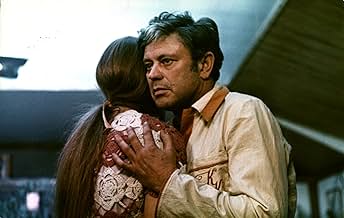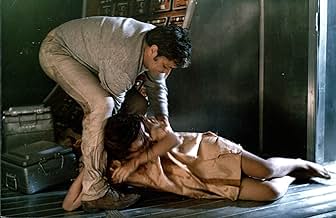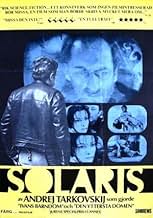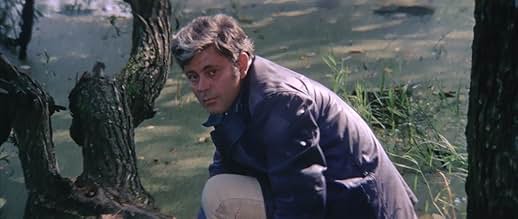Ein Psychologe wird zu einer Station geschickt, die einen fernen Planeten umkreist, um herauszufinden, was die Crew verrückt gemacht hat.Ein Psychologe wird zu einer Station geschickt, die einen fernen Planeten umkreist, um herauszufinden, was die Crew verrückt gemacht hat.Ein Psychologe wird zu einer Station geschickt, die einen fernen Planeten umkreist, um herauszufinden, was die Crew verrückt gemacht hat.
- Regie
- Drehbuch
- Hauptbesetzung
- Auszeichnungen
- 2 Gewinne & 4 Nominierungen insgesamt
- Doktor Snaut, kibernetik
- (as Yuri Yarvet)
- Mat Krisa Kelvina
- (as O. Barnet)
- Syn Anri Bertona
- (as V. Kerdimun)
- Gostya doktora Gribaryana
- (as O. Kizilova)
- Plemyannitsa Krisa Kelvina
- (as T. Malykh)
- Shanakhan, predsedatel komissii Anri Bertona
- (as A. Misharin)
- Professor Tarkhe
- (as B. Oganesyan)
- Anna, tetka Krisa Kelvina
- (as T. Ogorodnikova)
- Doktor Gribaryan, fiziolog
- (as S. Sarkisyan)
- Predsedatel nauchnoy konferentsii
- (as Yu. Semyonov)
- Chlen uchenogo soveta
- (as V. Statsinskiy)
- Professor Messendzher
- (as G. Teykh)
Empfohlene Bewertungen
I know that many friends to whom I've shown this move did not understand it. So I'm not saying you'll like it. But this is possibly the best (non-action) sci-fi movie ever made.
Watch it at night, alone, when everything out of your home is dark, silent, and cold.
Well, this movie has restored my faith in what is possible to achieve under the guise of "sci-fi" (obviously, it's older than "Star Wars", but I didn't see it until years later, when I had basically written off the whole idea of science fiction movies). I saw it 10-15 years ago when it was re-released in the USA and liked it then, but seeing it again recently has convinced me that this is an all-time classic. As I said, it actually stimulates thought (rare enough in most sci-fi movies), but on top of that, it has a real and profound emotional impact that's far beyond what you find in most "dramas", let alone "kid stuff" like sci-fi. If this movie is intended to be an "answer" to "2001" (I'm not convinced that it is), the main contrast is that "Solaris" concerns itself with real human emotions, whereas the most interesting character in "2001" is the computer.
For those who complain that it's boring, just go see something else. You'll obviously never get it. If the opening shot of water and plant life didn't tip you off to the fact that this movie is intentionally paced a little bit more deliberately than, say, "Buckaroo Banzai", then you should go out and try to get some sort of clue before watching this movie. It's not boring... it's SLOW. It's *meant* to be slow. Some of the scenes exist solely to set a mood, not to advance the plot. If you can't handle that, then this isn't the movie or you. But if you're able to sit still for 3 hours without squirming, and if you're able to enjoy a movie without having every idea spelled out in giant neon letters, then you just might like "Solaris", and find that it haunts you for years to come.
So comes December 2009, and Film 4 show both Solaris films. I sat transfixed by the Russian film. Visually it is a thing of beauty, and it is a rare thing - a film which requires input from the viewer. This movie requires you to think for yourself...and some people find that difficult.
I enjoy a rip-snorting entertaining action movie as much as most people, but rare films like Solaris leave me feeling so much more fulfilled. There are ambiguities, not so much loose ends untied as dots which the viewer is required to connect for himself.
Try Solaris. If you find yourself twiddling your thumbs after 15 minutes then its probably not for you. If you find yourself glued to the screen then you know how I feel about this film.
Solaris is often accused of being slow. This is a common misinterpretation: Solaris makes you anxious, and willingly so. Too many segments are like mirrors that invite your mind to venture off into many uncomfortable a place (the traffic scene comes to mind: an allegory for the space voyage but also for fading life and powerlessness). Solaris also makes you fear, with a sense that something isn't quite right and as with the best horror films, what you dread often isn't even on screen. Solaris makes you heart ache on several occasions as well. It makes you miss loved ones and it makes you feel homesick. every additional minute that separates you from the gorgeous opening shots of nature makes you long for Earth.
Solaris is many things but above all it is simply more than entertainment: it is a voyage for the senses, like a favorite song that binds countless disconnected feelings and thoughts. It is a poem.
As with most movies that have been saddled with the word "greatness," I understand why "Solaris" is considered to be such a watershed movie and so revered by so many, but I have to admit that I didn't personally feel myself responding to it all that much. Maybe I would on a second (or third or fourth) viewing, but I can't say I'm very compelled to watch it again. It's cerebral and philosophical, which I expected, and a bit cold and emotionally uninvolving despite the fact that it's about almost nothing but human emotions and how we react to life's biggest mysteries. I didn't warm much to the characters or ever really think of them as individual human beings so much as necessary conduits for communicating the film's philosophical ruminations. Despite being set in the vast reaches of space, it's a claustrophobic movie, which I think is intentional. We never see space, only the cramped interiors of a spaceship, and that feels right, since the movie is more about the vast universe contained within Man's head than it is about the great physical universe beyond our solar system's borders.
What I liked most about "Solaris" is that it suggests that Man isn't really developed enough to handle breakthroughs in our understanding of the larger universe. Given the chance to explore space and engage with elements beyond our comprehension, the characters in the movie instead spend all of their time ruminating over and regretting the people they left behind on Earth and the mistakes they made there. It's almost like Mankind turns to solving giant huge mysteries as a distraction from the fact that we're not capable of cracking the lesser, more mundane mysteries of everyday life, like love, commitment, and dependence on one another.
"Solaris" does have one chilling and memorable ending, I'll give it that. If we go poking around in what we don't understand, it seems to say, we may very well find ourselves unable to return to what we do.
Grade: A-
Wusstest du schon
- WissenswertesThis was the most widely seen of Andrei Tarkovsky's films outside of the Soviet Union. However, Tarkovsky himself reportedly considered it the least favorite of the films he directed. Not being a fan of the science fiction genre (which he criticized for its "comic book trappings and vulgar commercialism"), he was nevertheless persuaded to propose this adaptation of the eponymous and popular sci-fi novel 'Solaris' to appease the Soviet censors. However, he considered the film an artistic failure because of its need for technological dialogue and special effects, which prevented it from transcending its genre; something he believed his movie Stalker (1979) did better.
- PatzerAt the moment when the station attains zero gravity, the candlestick passes floating in the air, with the flames burning the same as in earth. Actually, with zero gravity, the fire doesn't go upward, candle flames would rather be spherical and very weak (blue).
- Zitate
Dr. Snaut: Science? Nonsense! In this situation mediocrity and genius are equally useless! I must tell you that we really have no desire to conquer any cosmos. We want to extend the Earth up to its borders. We don't know what to do with other worlds. We don't need other worlds. We need a mirror. We struggle to make contact, but we'll never achieve it. We are in a ridiculous predicament of man pursuing a goal that he fears and that he really does not need. Man needs man!
- Alternative VersionenThe Region-4 DVD was released by Shock as part of its Distinction Series and runs at 2 hours and 49 minutes, with some noticeable cut scenes throughout the films. This 2-disc set doesn't contain any deleted/alternate scenes.
- VerbindungenEdited into Spisok korabley (2008)
- SoundtracksThe Little Organ Book: Ich Ruf Zu Dir, Herr Jesu Christ - BWV 639
Composed by Johann Sebastian Bach (as I. S. Bakh)
Top-Auswahl
Details
- Erscheinungsdatum
- Herkunftsland
- Offizieller Standort
- Sprachen
- Auch bekannt als
- Điều Tạo Nên Con Người
- Drehorte
- Akasaka, Minato, Japan(Berton's car scenes)
- Produktionsfirmen
- Weitere beteiligte Unternehmen bei IMDbPro anzeigen
Box Office
- Budget
- 1.000.000 RUR (geschätzt)
- Bruttoertrag in den USA und Kanada
- 22.168 $
- Eröffnungswochenende in den USA und in Kanada
- 11.537 $
- 15. Sept. 2002
- Weltweiter Bruttoertrag
- 230.989 $
- Laufzeit
- 2 Std. 47 Min.(167 min)
- Farbe
- Sound-Mix
- Seitenverhältnis
- 2.35 : 1



















